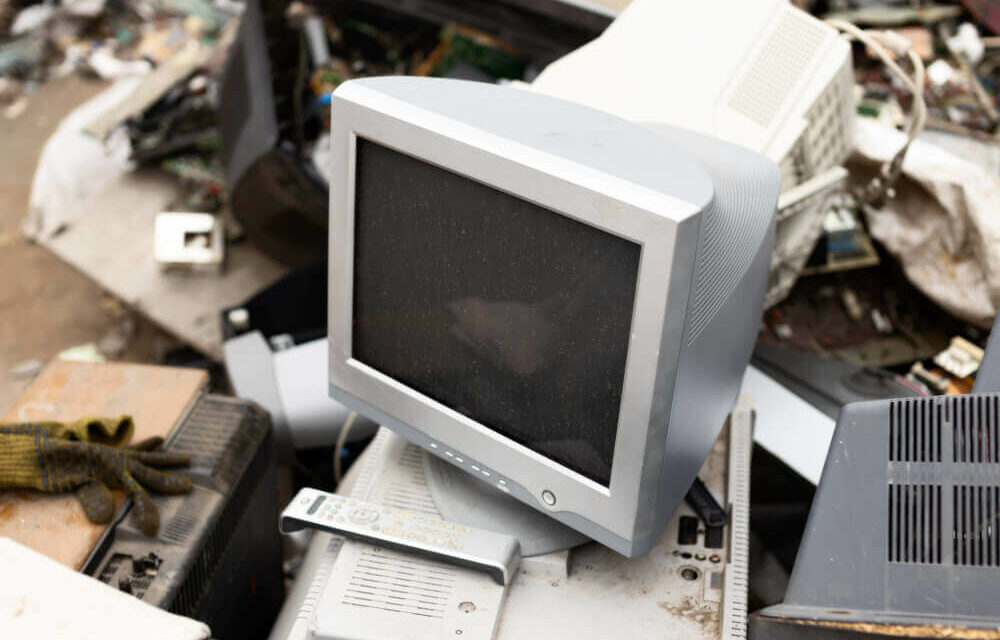Electronics waste, or e-waste, is a growing global crisis. In 2022, the world generated a record 62 million tonnes of e-waste, yet only about 22% was properly recycled. To put that in perspective, that’s roughly 137 billion pounds of discarded TVs, phones, PCs, and more, with less than one-quarter recycled. Many of these devices, like old laptops, desktops, and monitors, contain toxic chemicals. One UN report notes that e-waste contains toxic additives or hazardous substances such as mercury that harm human health and the environment. Therefore, merely discarding an outdated computer or monitor increases the danger of soil and water pollution by allowing metals and chemicals to leak into landfills. That’s why old computer disposal must be done responsibly: recycling or donating old machines prevents pollution, conserves resources, and even helps protect your personal data.
Why Recycling Old Computers Matters
Piles of outdated computers and monitors can leak dangerous substances if not handled properly. Most old PCs contain components with hazardous materials. Let’s take the case of old CRT monitors; these monitors contain enough lead that they are classified as hazardous waste if thrown out normally. If these toxins aren’t recycled, they can contaminate soil and groundwater. Moreover, electronics are made with valuable materials like gold, copper, aluminum, and rare earths. These resources can be recovered and used again through computer recycling. In fact, every year we dump billions of dollars’ worth of recoverable metals into landfills instead of mining new ore. By recycling, we reduce the need for new mining and manufacturing, cutting pollution and conserving energy.
The e-waste problem continues to grow rapidly. High-income countries own 109 electronic devices per person on average, and as global consumption rises, more computers reach end-of-life each year. In fact, e-waste is increasing by about 33% from 2022 to 2030 if nothing changes. That makes recycling old computers more important than ever. It is worth remembering again that each recycled laptop helps keep harmful chemicals out of the environment and recovers the equivalent energy and materials of several new devices.
Benefits of Recycling Old Computers
Conserves Resources and Energy
Computers contain metals and plastics that take a lot of energy to produce. Recycling recovers these materials, reducing the need for new mining and manufacturing. According to the U.S. EPA, recycling one million laptops saves as much energy as powering 3,500 U.S. homes for a year.
Reduces Pollution and Climate Impact
Making new electronics emits greenhouse gases and other pollutants. Recycling old machines avoids much of that impact. Recycling prevents greenhouse gas emissions from the production of new materials, air and water pollution, and the depletion of natural resources, according to authorities. Other research similarly notes that recycling computers helps reduce tons of greenhouse gas emissions, helping fight climate change.
Protects Data and Privacy
Recycling programs usually include data destruction. Wiping or physically destroying your hard drive before recycling ensures personal files don’t get into the wrong hands. The proper handling of such components means you can dispose of old computers safely without compromising privacy.
Helps Others
If your computer still works, donating it gives someone else a chance to use it. Refurbished computers often go to schools, non-profits, or low-income families. Donating extends a computer’s life and keeps it out of the waste stream longer. It’s a win-win for everyone involved; you help people in need and delay the need for recycling altogether.
Legal Compliance and Safety
Many places have laws about e-waste. In the U.S alone, 24 U.S. states now require electronics recycling, and 14 ban computers and monitors from landfills entirely. Using official recycling programs ensures you also follow the law. It also means actions like old computer monitor disposal are handled by specialists, protecting sanitation workers and communities from unsafe disposal.
A Guide on How to Recycle Your Old Computers
Back up Your Data
Before doing anything else, save important files to a secure location like an external drive or the cloud. Once you confirm your data is safe, erase it from the old device. Simply deleting files or reformatting isn’t enough, so use a trusted disk-wiping tool or use built-in secure-erase functions. The goal is to make the data unrecoverable. This protects your privacy when disposing of old computers.
Remove Batteries and Accessories
If you have a laptop, remove the battery and recycle it separately. The authorities advise that lithium-ion batteries must not go into regular trash or recycling bins. Many retailers and battery centers accept spent laptop batteries. Also, detach any peripherals or cables so they aren’t lost, and you may be able to reuse them.
Clean and Disassemble if Needed
Wipe down the computer and disconnect any external memory cards or USB drives. If you wish, you can keep parts like RAM or old drives if you plan to repurpose them. For desktops, consider removing the hard drive entirely for extra security. If your drive is fragile or you’re very concerned about data, you can physically destroy it (drilling holes or shredding the platters) before recycling.
Find a Recycling or Reuse Option
-
Donation/Reuse
First, check if the computer still works well enough to donate or sell. If yes, you may give it to a school, charity, or refurbisher. This extends the device’s life and helps someone in need.
-
Manufacturer Take-Back
Many computer makers offer free mail-back or drop-off recycling programs, some program lets you drop off any brand of PC for free recycling.
-
Retailer Recycling
Big retailers often accept old electronics. Many stores accept multiple devices per household for recycling. Home improvement stores also typically have battery drop-off bins. There is usually no charge for residential drop-off of consumer devices.
-
Local E-Waste Programs
Check with your city or county waste department. Many communities hold periodic e-waste collection events or maintain permanent drop-off centers. Use online locators to find nearby certified recyclers or collection sites. These services ensure electronics are handled safely, not dumped in landfills.
-
Sell or Trade-In
If the computer still has value and you are upgrading, consider a trade-in service. Retailers and some recyclers offer store credit or cash for functioning devices.
Drop it Off or Ship
Take your prepared computer to the chosen recycling location, or ship it using the provided label. If dropping off, follow any staff instructions, as some recycling sites may ask you to plug in devices to verify they work. Keep any receipts or certificates of recycling if available. This documentation can be useful for business records or proof of compliance.
Dispose of Other Computer Parts
Don’t forget peripherals and parts. Keyboards, mice, and cables can also be recycled at many drop-off points. For old computer monitor disposal, note that flat-panel monitors are recyclable as e-waste, but CRT monitors require special handling due to lead content. Always inform the recycler if you have a CRT, and they will sort it separately. Printers, scanners, and speakers typically can go to the same electronics recycling program.
Computer Recycling Options and Programs
National Television and Computer Recycling Scheme
Launched in 2011, the NTCRS is Australia’s flagship program for computer disposal and broader e-waste recycling. Under this scheme, households and small businesses can drop off old desktop and laptop computers, as well as associated peripherals. Since its inception, the NTCRS has recycled over 160,000 tonnes of televisions and computers.
Retailer Drop-Off and Take-Back Programs
Many major Australian retailers also accept unwanted computers as part of their own recycling initiatives, making computer disposal straightforward and convenient. Most will take desktops, laptops, and monitors free of charge from residential customers, sending them on to an NTCRS-approved recycler. Some electronics chains typically offer in-store bins for old computing equipment, too. Furthermore, manufacturers like HP and Dell run branded take-back schemes where you can arrange a prepaid mail-back label or drop off your device at designated sites.
Local Council and Community Collections
Across Australia, state and local councils frequently organize e-waste drives and maintain permanent collection centers where residents can drop off unwanted electronics at no cost. These events often target a range of devices, so you can handle your old computer disposal in one trip. In some regions, council-run “Tech Drop-Off Days” are held several times a year, providing an easy way to recycle bulky items that require separate handling. To find upcoming events or permanent e-waste depots, check your council’s website.
Accredited and Certified Recyclers
If you need to dispose of large volumes of computers or have specialised equipment, it’s best to work with accredited recyclers in Australia. Look for certifications like APCO endorsement, ISO 14001, or AS/NZS 5377:2013 accreditation, which guarantee that hazardous materials are processed safely and data is securely destroyed.
Recycling Costs and Fees
For most households in Australia, old computer disposal via NTCRS and participating retailers is completely free. Businesses or individuals with large quantities of equipment may incur fees, which typically vary based on volume, equipment type, and the recycler’s certification level. If you are simply donating a working computer, charities or social enterprises may request a small donation to cover refurbishment, but won’t charge a standard recycling fee. Always ask for a quote or check program guidelines if you suspect charges might apply.
Conclusion
Recycling an old computer is easier and more beneficial than ever. By following the steps, you can computer disposal into something eco-friendly. While doing so, you will be preventing toxic materials from polluting the planet, conserving energy and resources, and possibly even getting a tax benefit or retailer credit. You could donate a working laptop to charity or drop off a broken desktop at an e-waste facility; whichever option you choose, know that you are making a real difference. Next time you wonder what to do with an outdated PC or laptop, remember: recycle it, and help give its parts a second life instead of ending up in a landfill.
Before you retire that old desktop or laptop, remember that you don’t have to figure out e-waste on your own. Cyber Recycling will pick up any working or broken computer equipment and take care of every step for safely processing it. Whenever you are ready to let go of that old computer, Cyber Recycling makes it easy to do the right thing, protecting your privacy, supporting local reuse efforts, and helping our community move toward a truly circular approach to electronics.


